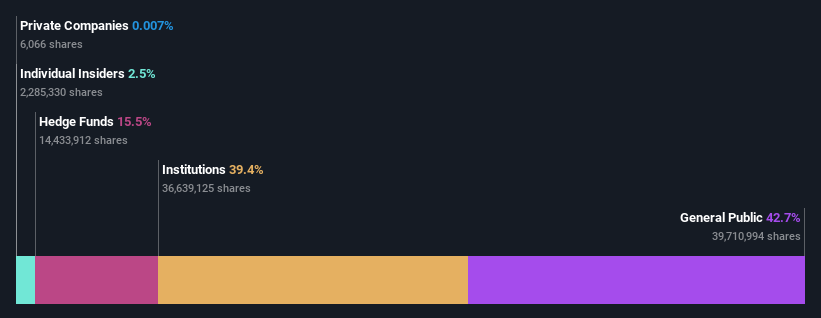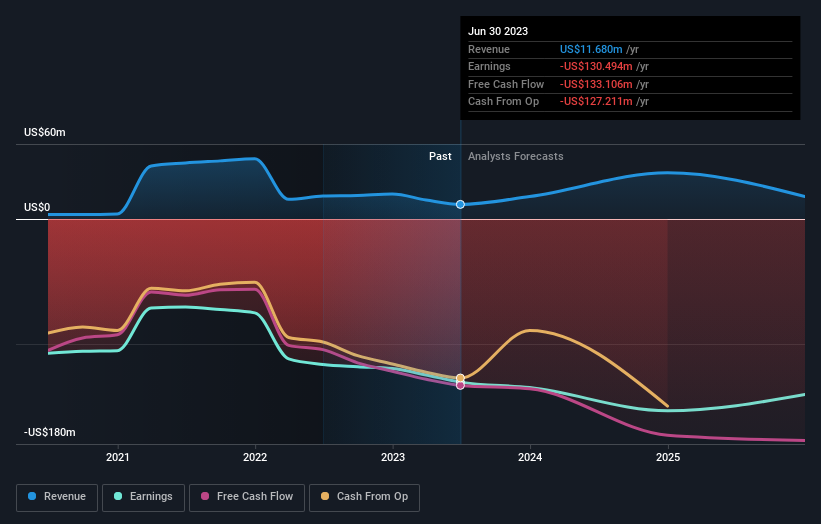retail investors who own 43% along with institutions invested in Gritstone bio, Inc. (NASDAQ:GRTS) saw increase in their holdings value last week
Key Insights
Gritstone bio's significant retail investors ownership suggests that the key decisions are influenced by shareholders from the larger public
A total of 17 investors have a majority stake in the company with 50% ownership
A look at the shareholders of Gritstone bio, Inc. (NASDAQ:GRTS) can tell us which group is most powerful. We can see that retail investors own the lion's share in the company with 43% ownership. That is, the group stands to benefit the most if the stock rises (or lose the most if there is a downturn).
Following a 57% increase in the stock price last week, retail investors profited the most, but institutions who own 39% stock also stood to gain from the increase.
Let's delve deeper into each type of owner of Gritstone bio, beginning with the chart below.
View our latest analysis for Gritstone bio
What Does The Institutional Ownership Tell Us About Gritstone bio?
Institutional investors commonly compare their own returns to the returns of a commonly followed index. So they generally do consider buying larger companies that are included in the relevant benchmark index.
Gritstone bio already has institutions on the share registry. Indeed, they own a respectable stake in the company. This suggests some credibility amongst professional investors. But we can't rely on that fact alone since institutions make bad investments sometimes, just like everyone does. When multiple institutions own a stock, there's always a risk that they are in a 'crowded trade'. When such a trade goes wrong, multiple parties may compete to sell stock fast. This risk is higher in a company without a history of growth. You can see Gritstone bio's historic earnings and revenue below, but keep in mind there's always more to the story.
Our data indicates that hedge funds own 16% of Gritstone bio. That's interesting, because hedge funds can be quite active and activist. Many look for medium term catalysts that will drive the share price higher. Point72 Asset Management, L.P. is currently the largest shareholder, with 8.1% of shares outstanding. For context, the second largest shareholder holds about 7.4% of the shares outstanding, followed by an ownership of 6.7% by the third-largest shareholder. Furthermore, CEO Andrew Allen is the owner of 1.6% of the company's shares.
A closer look at our ownership figures suggests that the top 17 shareholders have a combined ownership of 50% implying that no single shareholder has a majority.
While it makes sense to study institutional ownership data for a company, it also makes sense to study analyst sentiments to know which way the wind is blowing. There are plenty of analysts covering the stock, so it might be worth seeing what they are forecasting, too.
Insider Ownership Of Gritstone bio
The definition of an insider can differ slightly between different countries, but members of the board of directors always count. Management ultimately answers to the board. However, it is not uncommon for managers to be executive board members, especially if they are a founder or the CEO.
Most consider insider ownership a positive because it can indicate the board is well aligned with other shareholders. However, on some occasions too much power is concentrated within this group.
We can see that insiders own shares in Gritstone bio, Inc.. It has a market capitalization of just US$160m, and insiders have US$3.9m worth of shares, in their own names. This shows at least some alignment, but we usually like to see larger insider holdings. You can click here to see if those insiders have been buying or selling.
General Public Ownership
The general public, who are usually individual investors, hold a 43% stake in Gritstone bio. While this group can't necessarily call the shots, it can certainly have a real influence on how the company is run.
Next Steps:
While it is well worth considering the different groups that own a company, there are other factors that are even more important. Like risks, for instance. Every company has them, and we've spotted 5 warning signs for Gritstone bio (of which 2 don't sit too well with us!) you should know about.
But ultimately it is the future, not the past, that will determine how well the owners of this business will do. Therefore we think it advisable to take a look at this free report showing whether analysts are predicting a brighter future.
NB: Figures in this article are calculated using data from the last twelve months, which refer to the 12-month period ending on the last date of the month the financial statement is dated. This may not be consistent with full year annual report figures.
Have feedback on this article? Concerned about the content? Get in touch with us directly. Alternatively, email editorial-team (at) simplywallst.com.
This article by Simply Wall St is general in nature. We provide commentary based on historical data and analyst forecasts only using an unbiased methodology and our articles are not intended to be financial advice. It does not constitute a recommendation to buy or sell any stock, and does not take account of your objectives, or your financial situation. We aim to bring you long-term focused analysis driven by fundamental data. Note that our analysis may not factor in the latest price-sensitive company announcements or qualitative material. Simply Wall St has no position in any stocks mentioned.


